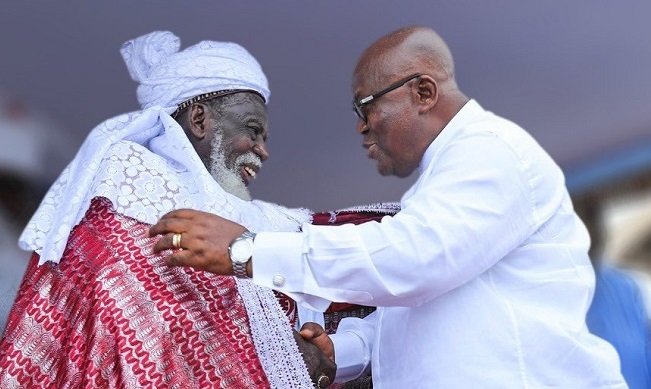Eid ul-Adha: Let’s sacrifice for the prosperity of Ghana – Akufo-Addo
President Nana Akufo-Addo has rallied Ghanaians to sacrifice in order to attain the desired development in the country.
As Ghana aims to achieve a status of economic independence without relying on foreign aid, the President has urged all citizens to put their shoulders to the wheels.
In his Eid ul-Adha message to Ghanaians on Tuesday, July 20, he said:
“The sacrifice of Prophet Ibrahim, which we celebrate today, must spur us on to sacrifice for the progress and prosperity of our country”.
He continued: “Sacrificing for our country means giving off our best in our various areas of endeavour, and making the national interest paramount in whatever we do”.
President Akufo-Addo also asked the Muslim Ummah in Ghana “to remember our nation in prayer; and also pray for wisdom and guidance for me and for members of my government, so that we can steer the ship of state in a manner that allows us to navigate the stormy and turbulent economic challenges that confront our nation and the world”.
He encouraged Muslims to make merry but celebrate in moderation to avoid unfortunate incidents, especially at a time where the COVID-19 pandemic lingers on.
“We need one another alive for the task of nation-building. May God bless us all, and our homeland Ghana, and make her great and strong. Salam Alaikum! Barika da Sallah!!”
What is Eid ul-Adha?
There are two key Eid’s (Celebration Festivals) in Islam: Eid ul-Fitr, which signifies the completion of the Holy Month of Ramadan; and Eid ul-Adha, the greater Eid, which follows the completion of the annual Hajj pilgrimage, at the time of Qurbani (sacrifice).
Although Eid ul-Adha has no direct relation to the Hajj Pilgrimage, it is but a day after the completion of Hajj and therefore has significance in time.
The day of Eid ul-Adha falls on the tenth day in the final (twelfth) month of the Islamic Lunar Calendar; Dhu-al-Hijjah.
The day that celebrations fall on is dependent on a legitimate sighting of the moon, following the completion of the annual Holy Pilgrimage of Hajj – which is an obligation for all Muslim’s who fit specific criteria, one of the important Five Pillars of Islam.
The celebration of Eid ul-Adha is to commemorate Prophet Ibrahim’s devotion to Allah and his readiness to sacrifice his son, Ismail.
At the very point of sacrifice, Allah replaced Ismail with a ram, which was to be slaughtered in place of his son.
This command from Allah was a test of Prophet Ibrahim’s willingness and commitment to obey his Lord’s command, without question.
Therefore, Eid ul-Adha means the festival of sacrifice.
Depending on the country, the celebrations of Eid ul-Adha can last anywhere between two and four days.
The act of Qurbani (sacrifice) is carried out following the Eid Salaah (Eid Prayers), which are performed in congregation at the nearest Mosque on the morning of Eid.
The act of Qurbani consists of slaughtering an animal as a sacrifice to mark this occasion in remembrance of Prophet Ibrahim’s sacrifice for Allah.
This is also known as Udhiya. The days of animal sacrifice total three days, from the 10th to the 12th of Dhu-al-Hijjah.
The sacrificial animal must be a sheep, lamb, goat, cow, bull or a camel; the sheep, lamb or goat consist of one Qurbani share, whereas a bull, cow or camel consist of seven shares per animal.
The animal must be in good health and over a certain age in order to be slaughtered, in a ‘halal’ friendly, Islamic way.
The Qurbani meat can then be divided into three equal portions per share; one-third is for you and your family, one-third is for friends, and the final third is to be donated to those in need.
Traditionally, the day is spent celebrating with family, friends and loved ones, often wearing new or best attire and giving of gifts.



